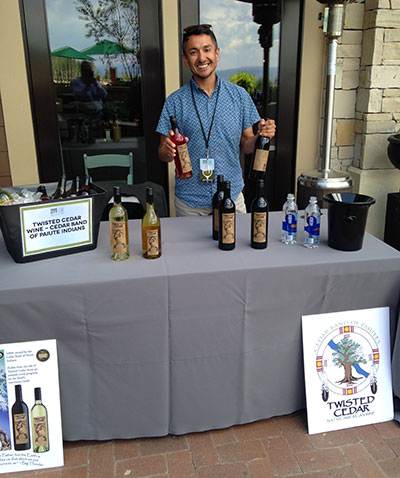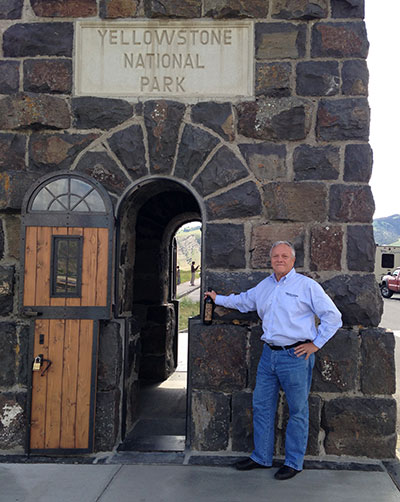By Elizabeth Zach, RCAC staff writer

Cedar City, Utah – The drive along Interstate 15, which meanders from the Mexican border in California to the Canadian border in Montana, can get plenty lonely. After 30 miles of virtually no services, there’s a reprieve: the well-stocked and clean convenience store and smoke shop, Cedar Band Trading Post, which the Cedar Band of Paiutes opened in 2012 in Utah.
Here in Cedar Valley, the high desert, water is sparse and the climate is cool and arid. According to the United States Census Bureau, Cedar City encompasses a little more than 20 square miles, none of which is covered with water.
Nonetheless, the Cedar Band of Paiutes is intent on building and sustaining a viable economy, mostly centered on a small manufacturing hub and some tourism. The popular Zion National Park is nearby, as is Cedar Breaks National Monument.
In 2013, the Cedar Band formed CBC Mortgage Agency (CBCMA), an off-reservation, government-approved FHA mortgage lender to provide mortgage down payment assistance to tribal members through grants and second mortgages.
Building on this momentum, the Band formed a unique beverage company that would eventually market and distribute wine from “sovereign nation to sovereign nation.” They planned to sell the wine to more than 400 Native American casinos across the United States.
Today, the Cedar Band Corporation Beverage Company, or CBC BevCo, owns the Twisted Cedar Native American Wine label which, in accordance with Paiute cultural beliefs, is a sustainably farmed varietal. The wine, which the Band says it took careful pains to select, is produced at Lange Twins Family Winery and Vineyards in Acampo, California. BevCo offers nine varietals, including a Cabernet Sauvignon, Chardonnay, Malbec, Merlot, Moscato, Petit-Petite, Sangiovese Rosé, Sauvignon Blanc and a Zinfandel.
In 2015, while negotiating a $600,000 RCAC loan to help expand the beverage company, RCAC loan officer Chuck Miller noted that the Band’s timing was fortuitous.
“The U.S. is the largest growing wine market in the world in terms of consumption and production, and American consumers spent over $40 billion on wine in 2013, an all-time high,” says Miller, adding, “No other Native American Tribe is producing wine for sovereign nation to sovereign nation business on a national or regional scale.”
According to Paul B. Terry, the president and CEO of Cedar Band Corporation, conventional lenders were hesitant and, ultimately, unwilling to lend to a start-up venture, especially a start-up Native American wine company. So Terry reached out to Dave Conine, the U.S. Department of Agriculture’s Rural Development state director in Salt Lake City, who referred him to RCAC.
“Dave’s words turned out to be the most fortuitous and relevant that he could have ever uttered to me during our meeting,” recalls Terry.

And yet, in terms of Terry and the Band’s eagerness to grow the business, they were already ahead of the curve. By comparison, according to BevCo’s Vice President, Bill Tudor, while there are Native American wineries in the United States, their production is very small with typically less than 2,000 cases per year.
The Cedar Band of Paiutes is one of five bands that constitute the Paiute Indian Tribe of Utah and it is among the largest of those. The Tribe counts some 880 members; Cedar Band numbers about 275. In developing its wine business the Band was selective about the wine it would produce and distribute and about what kind of company it wanted to be with respect to its customers, in light of the fact that alcoholism is still a serious problem on tribal lands, according to Terry.
“We have very few true Native American customers,” Terry says, noting that the company currently distributes to nearly 30 casinos. “The casino customers are mostly Caucasian Americans who gamble and consume. We can’t sell the wine from our offices, or even from our convenience store, here in Cedar City, Utah. We actually have to go to the Utah State Liquor Stores and Package Agency (or Contract) Stores. It’s been a very conscious decision on (the Band’s) part; we’re not targeting our own people, or any other Band’s or Tribe’s indigenous people but rather the general clientele of casinos.”
Alongside selling to Native gaming outlets, BevCo has expanded its marketing to “farm to table” restaurants and independent hotels. In 2015, it sold 1,200 cases to Whole Foods, an admirable coup considering that the company was in competition with several hundred wines vying for consideration. The Smithsonian’s National Museum of the American Indian in Washington D.C. also selected Twisted Cedar as its Native American wine feature for catered events; and the Heard Museum of Native Cultures and Art in Phoenix serves Twisted Cedar in its restaurant.
Nonetheless, the company has had some growing pains.
It had initially planned to expand its licensing and sales to 15 states. In 2015, it opened markets in Maryland and Washington D.C., and intended to follow in 10 more states. By last year, BevCo looked to expand throughout the rest of the country and even considered export options. It launched a website, www.twistedcedarwines.com, and retained its market uniqueness. No other Tribe is competing with as much volume.
But this planned growth stalled.
“We have not yet been successful in getting into every state, as per our original projections,” said Ean Jacomb, Cedar Band Corporation’s controller. “This is primarily because we had to reduce BevCo’s staff down to one person (from three). This individual can only do so much, as a couple of Cedar Band Corporation’s subsidiary companies were experiencing financial struggles, and we needed to reassess business development, marketing, and overall business models, and then to realign management and staff in the two struggling subsidiaries.”
But the mortgage agency, he added, has meanwhile become very profitable, which will help BevCo.
“We’re looking at expanding again,” later this year and into next, “since all the other operating companies either continue to experience double-digit growth or are starting to turn a profit,” Jacomb said. “We’ll be able to pay down incurred and other legacy debts and as soon as that is done, we’ll revisit BevCo’s hiring needs.”
Things already seem to be looking up. In October 2016, the company acquired the right to sell to the Army and Air Force Exchange Service (AAFES) which runs the retail stores at Air Force bases and Army posts around the country and the world. According to Terry, this is a major achievement that took years of work toward “getting an audience with the right people.”
“It’s huge that we got the green light,” he says. “On bases and posts, you have a captive audience. This is really a tremendous win for us, it will be the customer that pushes us above the line relative to our profitability because of the potential market selling to AAFES main stores.”
The fact that the Cedar Band Corporation Beverage Company has had small successes so far, he says, is encouraging.
“We’ve spoken to other wineries and wine companies that have been in the wine industry for a century,” he says. The wine industry, he goes on to explain, can be notoriously fickle. “Long-standing wine families with very small operations and their own land where they grow their own grapes have often struggled for years to find distributors. But we’ve actually had people look to acquire us because of our distribution channels.”
On that note, Terry expects the company to be profitable this year, adding, “We continue to see positives through slow growth.”
